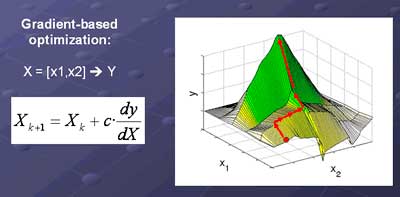
PLS Optimization
The optimization of batch processes is an extremely hard task since these processes are complex and difficult to understand. This is the principal reason why the optimization cannot be solely knowledge-driven and we also need to rely on input-output data. Most batch processes are repetitive in nature. Provided the process is tightly controlled, as this is the case in most industrial processes, and given a specific recipe, the evolution of a batch resembles that of preceding ones. This is the perfect scenario for the application of PLS methods. The objective in a PLS optimization is to learn from the past batches in order to improve the performance of the current one.
We have developed a new optimization approach based on the PLS philosophy plus three additional ideas:
- The batch-wise unfolding transforms the three-way data into a much simpler two-way structure which is appropriate for PLS optimization.
- A PLS model can be used as an estimate of the gradient of the function to optimize. With this estimate, a gradient-based optimization is carried out.
- Non-linearity and Non-convexity problems can be faced using adaptive PLS plus a set of heuristic rules. We rely on the PLS model only to a certain extent, which depends on the predictive error of the model.

The optimization procedure follows a self-tuning extremum-seeking algorithm. The approach has proven to be very effective and versatile, low-sensitive to nonlinearities and uncontrolled variability, and robust to changes in the process. Extensions to handle measurements on initial conditions, several performance indices and inequality constraints are straightforward. As main advantage, no knowledge about the process is necessary. In any case, fundamental knowledge can be integrated in the optimization straightforward.